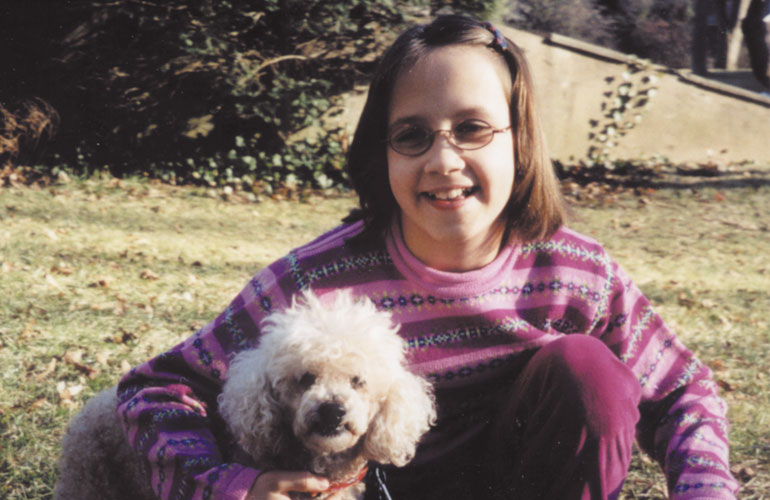“I hate him! I want to give him back! I wish we never adopted him!” My 10-year-old daughter, Anna, glares, not at a younger brother, but at Mills, our new, older miniature poodle. Mills snarls back, baring the few teeth he has left.
Anna was three when I, a single parent, adopted her as an older child from Russia. As soon as she could speak English, she began to ask for a dog. After years of intense pleading, no longer wanting to postpone Anna’s life desire, I finally relented and began our search for a dog.
Mills joined our family through a rescue group. He was a stray, about 10 years old, found in the woods eating a dead deer.
Soon after Mills arrived, Anna realized he wasn’t the perfect dog. He wouldn’t frolic and play all day at her high energy level. He’s old. He’s happy to sleep in any cozy spot. Although loving and affectionate, he growls and snaps unpredictably.
When he’s settled into his own territory or feels the need to protect me, he snarls and barks at Anna. Despite this, he wakes her up every morning with snuggles and licks. Anna loves him and hates him at the same time.
Bonded for Life
Being an older mother myself, I chose older child adoption, unaware of the behavioral problems I might encounter. Anna had spent her first two-and-a-half years with her birth mother, in an impoverished, neglectful environment. She was often hungry, dirty, and alone.
She then spent nine months in an orphanage before I adopted her. To say her early years were difficult is an understatement.
From the moment Anna and I met in a dim Moscow airport, we bonded fiercely. Thirty-six hours later we began our trip home, nine hellish hours in an airplane. Anna’s tantrums started on that flight, and continued to a lessening degree for seven years.
Once home, Anna and I became extremely attached to one another, yet she exploded into raging tantrums daily. Anything could trigger one — a misunderstood word, the wrong food, a change in plans, my leaving the room.
Generally a mellow, patient person, I found myself exploding back, sounds coming out of my mouth unlike any I knew I could make. I sometimes held her in a body lock to protect myself and to calm her.
When Anna began school, she became a Jekyll-and-Hyde character, perfectly behaved there but explosive at home. During all this I loved her fiercely, and was totally committed to her.
I read everything I could about attachment, post-traumatic stress, sensory integration. With time and work and maturity, things are much, much better. Anna’s tantrums are now rare. I’ve learned to recognize and diffuse an oncoming tantrum by stopping and talking through the emotions before they explode.
But even in the darkest early days, I never wished that I had not adopted Anna, nor did I ever want to give her back.
So dare I make comparisons to her about Mills’ adoption? I tell her that we made a commitment to Mills, and we’re not giving him back, no matter what his behavior. We talk about how we know nothing about his former life.
We wonder if or how someone hurt him, causing him to be frightened, angry and territorial. We talk about how to make him feel secure. We talk how to correct his bad behavior through love and training, not anger.
But I stop short of saying, “I know Mills isn’t the perfect dog. But you weren’t the perfect child, either, and I never thought of giving you back.”
And I don’t compare Anna’s behavior directly to Mills’. But I hope, through Mills’ example, that she understands adoption is forever, that commitment and love triumph over a traumatic start in life.



